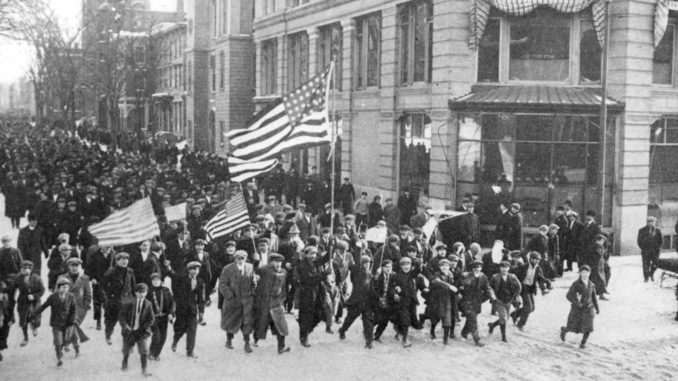
By Paul P
I was pleased to see that NYC-DSA passed a resolution encouraging its members to become rank-and-file union organizers. My experience as a social studies teacher in Philadelphia and member of PFT Local 3 has reinforced my conviction that workplace organizing should be central to the socialist project. My socialist politics inform how I organize in the workplace, and my union experience informs how I organize for socialism.
Workplace Organizing Is Central to the Socialist Project
As socialists, we believe that society is driven by the profits gained off the backs of the working-class and that disrupting the flow of profits is one of the most powerful ways to win the changes we want.
Think about it. We’ve seen some incredible mobilizations over the last 15 years: the Iraq War protests in 2003, the Occupy movement, and the “movement of the squares” around the world. But most of these mobilizations did not disrupt production or stop business as usual, so they were unable to achieve their intended results.*
Contrast that with the recent teacher strikes in the South. Mass strikes in West Virginia, Oklahoma, and Kentucky did more to address the problems of teachers, parents, and students caused by decades of austerity than any lobbying over the past 30 years. Closing down schools stopped business as usual and created a social crisis that the state was forced to deal with.
Socialism Informs How We Organize Workplaces
Socialists can bring a longer-term and broader perspective to labor organizing. We want to do more than build enough power to win a bigger raise on the next contract. We want to strengthen working people’s power to build a long-term movement to change society.
Concretely, this means pushing our unions to formulate and fight for demands that benefit all working people, not just demands related to our particular workplace (though those matter, too). For example, teachers’ unions can only win smaller class sizes, enough counselors and nurses, safe building conditions, and more after-school programs by fighting for higher taxes on corporations and the rich to support school budgets. Notice how the fights in West Virginia and Oklahoma naturally spilled into a fight over wealth and resource distribution. The natural gas companies became the enemy and the target.
Our socialist belief in building the power and capacities of working people to improve their lives also leads us to build democratic, inclusive unions whose members have as much ownership and involvement as possible.
Workplace Organizing Influences Socialist Politics, Too
The experience of workplace organizing can, in turn, temper our socialist politics in positive ways. You quickly learn in workplace organizing that sloganeering doesn’t work; there are no shortcuts. You also learn you have to maintain unity while appealing to a diverse set of people, a challenge we also face in advancing socialist politics. I think a change in this direction is underway in DSA. People are looking for campaigns that can appeal to the working-class majority, such as Medicare for All or free public education from pre-K through higher education.
Also, in a union or workplace setting, it’s hard to get anywhere if you engage in call out culture or Twitter wars. The demands and constraints of labor organizing help mitigate these behaviors, which I think are toxic for the left.
Workplace organizing can also help us to develop an organizer’s approach to advancing socialist politics. When you organize in a union, you don’t go from fighting for overtime pay to a general strike. You have to figure out intermediate campaigns that increase people’s skills, capacities, and confidence. Lately, I’ve been thinking that the same is true in regard to our recent electoral victories. Some people criticize candidates for not calling for “Revolution Now.” They’re not thinking about how we get from our current disastrous situation to something better that will help our chances in the future.
In recent decades, too many socialists have abstained from active intervention in the workplace and the broader labor movement. This is a fatal mistake; it is in unions that we can find the institutional resources and strategic leverage we need to transform society. Socialists have viewed labor as central to their movement since the earliest days of the socialist movement.
Today, leftist demands that haven’t moved people in a generation are capturing the imagination of millions in the United States. Making rank-and-file labor organizing a central aspect of our work again can put working people back on the offensive and help us win our goals.
*The exceptions were the mass mobilizations in Tunisia and Egypt, which disrupted business as usual with significant workplace action, and led to the downfall of dictatorships.
This article was adapted from a recent talk that Paul P gave at a NYC-DSA Labor Branch panel.
